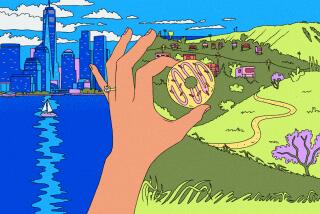San Diego: City of Strangers
SAN DIEGO — In “The Trip to Bountiful,” actress Geraldine Page plays a character who is miserably homesick. She leaves her home in Houston, with her son and a loathsome daughter-in-law, and heads for Bountiful--which, of course, no longer exists.
It exists in her mind, which to her is the only important thing. Millions of Americans make a similar journey every day, the experts say, to a Bountiful that takes many forms. Maybe it’s Anna, Ill. Maybe it’s San Diego. Maybe it’s a town they shouldn’t have left for a job they couldn’t turn down.
Maybe it’s only a memory . . . which isn’t to say it doesn’t exist.
Homesickness is a major problem. Almost every expert says so, be it psychiatrist, psychologist or social scientist picking up the cues to what ails America. Some call it urban loneliness, others nostalgia. Some even see it as a symptom of shattered American values--of too many years of The Self being holy, while The Community withers and dies. (In other words, if more people would get involved with the world around them, there would be less Angst .)
Dr. David Barron is a San Diego psychiatrist whose homesickness manifests itself in belonging to a local chapter of the University of Michigan Alumni Club, and in rooting for all the Detroit teams. Barron said Freud defined homesickness as a desire to return to the womb--to a place that’s safe and secure.
There’s a lot of that going around.
Sue Mitchell is a 49-year-old grandmother who lives in Spring Valley. Transplanted from Illinois for reasons even she is unclear about, Mitchell continues to think of home (Anna, Ill.) as her Bountiful--a place she’ll have to get back to for life to be complete.
She agrees with Barron, and with Freud, saying her homesickness has been “bad lately.” When a space shuttle blows up, or a Soviet reactor melts down, she feels a need to get back to Anna and put an arm around “those kids.” In a world filled with terrorism, she doesn’t feel safe in San Diego--but thinks she would in Anna.
Gordon Clanton, a sociologist at San Diego State University, sees homesickness as the dark side of one of the trade-offs made every day in American life. In a decade known mainly for its high technology and high mobility, jobs and resumes may flourish; the heart--romance and relationships--will almost certainly pay the price.
What we gain in salary, Clanton said, in career advancement, even social prestige, we may be losing in familiarity, consistency and love. Parents may be losing the “extended family” for children whose grandparents are strangers in a strange land--Kansas, Idaho, Nebraska or Utah. “Seeing them” may be relegated more often to a videocassette that arrives in the mail.
California may offer the most extreme case, Clanton said, of Vance Packard’s thesis expressed in “A Nation of Strangers.” With mobility comes personal gain--and, he said, the feeling of not knowing a neighbor. With enough neighbors not knowing one another, not feeling attached to community or address, homesickness is a wistful byproduct.
“Although trivial,” Clanton said, “sport may offer an alternative form . . . of social commitment. It may be a statement of our emotional and civic shallowness that sports teams express a sense of us-ness.”
How else to explain so many Cub fans rooting for Chicago in San Diego? Boston Celtic or New York Yankee fans rooting for those teams anywhere?
Why is “the home team” so hard to define?
In San Diego, where so many come from someplace else, mobility is a major force. Many will leave for someplace else; many more keep coming every day. What emotional fallout follows the trail?
“You cannot have mobility and not have rootlessness,” Clanton said. “They are, I’m afraid, inextricably intertwined.”


